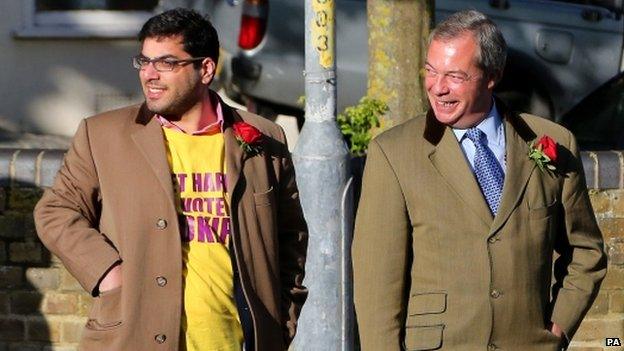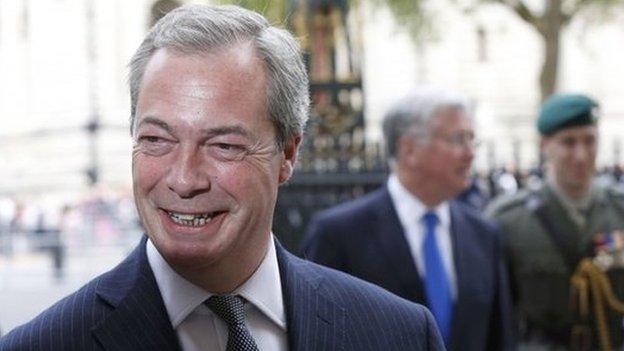UKIP's Nigel Farage rules out quitting as leader
- Published
Nigel Farage: "The level of support for me in the party is phenomenal"
UKIP's Nigel Farage has ruled out standing down as leader of the party despite a bitter row over his future.
Mr Farage told the BBC's Question Time he had a "phenomenal" level of support within the party.
Leaving just as the PM was addressing the UK's relationship with the EU would be a "massive mistake", he said.
It follows a row in which UKIP's election campaign chief said Mr Farage had become "snarling" and "aggressive". Two aides subsequently departed.
Mr Farage also addressed a row over £650,000 in public funding available to UKIP under a scheme to help minor parties fund their MPs' activities.
He said he would recommend the party accepted none of it because he did not want "UKIP to look like other parties, grubbing around after public money".
'Personal wars'
UKIP gained nearly four million votes in the election, but only one MP - Douglas Carswell in the Clacton constituency.
Mr Farage stood down after failing to win the Kent seat of Thanet South, but was reinstated three days later when the party refused to accept his resignation.
This led to a divide at the top of the party which BBC political correspondent Robin Brant described as "very public and very nasty".
Patrick O'Flynn: "We've seen too much aggression"
Campaign chief and MEP Patrick O'Flynn on Thursday said Mr Farage had become "snarling, thin-skinned" and aggressive, external during the election campaign, and blamed his team of "aggressive" and "inexperienced" aides.
Asked on Question Time about the situation, Mr Farage said it would be the wrong time to step down.

Analysis by political correspondent Robin Brant
Nigel Farage has almost certainly seen off the (anonymous) calls for a leadership election, so he is staying on. But it's come at a big price.
He's been forced to jettison his two closest advisors and side with Douglas Carswell in rejecting £650,000 in public money the party is due. It's clear some senior figures think he - and the party - needs a break.
MEP Steven Woolfe told the BBC Mr Farage should take the summer off, and his deputy Paul Nuttall should step up. Intriguingly, it wasn't Mr Nuttall whom Mr Farage anointed as his favoured successor when he initially stood down last week.
He also sided with critics who attacked the "aggressive" approach of the leader during the election, conceding that "the tone slipped".

He predicted that Prime Minister David Cameron would bring forward the promised referendum on the UK's membership of the European Union and said it would not be right for UKIP to spend three months on a leadership campaign.
"The level of support for me in the party is phenomenal and, frankly, to go through a leadership contest at a time when [David] Cameron says he's renegotiating our relationship with the European Union would be a massive, massive mistake," he said.
And he said that although he was disappointed by Mr O'Flynn's remarks, people were merely "letting off steam and... fighting personal wars" after a high-pressured election campaign.
Mr O'Flynn, who is also the party's economic spokesman, later clarified that he wanted Mr Farage to remain leader, but the party confirmed the departures of secretary Matthew Richardson and chief of staff Raheem Kassam.
Several senior figures waded into the row, with deputy leader Suzanne Evans and donors Arron Banks and Richard Desmond declaring their support for Mr Farage.
But party treasurer Hugh Williams, donor Stuart Wheeler and ex-MEP Godfrey Bloom all suggested he should go, amid claims MEPs were under pressure to publicly support the leader.

After his departure Mr Kassam said he did not think Mr O'Flynn and Mr Carswell had a place in the party
Mr Kassam denied he had been sacked, saying his contract was due to end, and dismissed any suggestion he had encouraged an aggressive approach. He added that the Times article smacked of an attempted coup.
'Political nous'
He told BBC Radio 4's Today programme he had not advised Mr Farage to stay on in all circumstances, and said the question was not about his personality or his charisma, but about his political leadership.
"Was there anybody, at that point in time, ready to take the reins of a party which was still trying to find out in itself whether it held a successful or unsuccessful general election campaign?
"I don't think there was anybody who was willing to face up to the realities of the fact that we only got one seat but four million votes.
"I don't think anybody apart from Nigel has the wherewithal and the political nous in the party to make those snap decisions based on that."
He criticised Mr O'Flynn and Mr Carswell for their role in the row.
"These people are not acting in the best interests of the party, what they are doing is bringing the party into major national disrepute and I don't think they have a place in the party."
'Full strength'
Steven Woolfe, one of the party's MEPs and its immigration spokesman, said he was advising Mr Farage - who suffered major injuries in a plane crash in 2010 - to take some time off over the summer and to return at "full strength and capability".
He suggested the party's reluctance to give him time to "recuperate" out of the public spotlight had partly triggered the internal ructions. "Of course we want him to stay," he told Radio 4's Today Programme.
"The voters are the ones that have been backing him. They are not really concerned about the intricacies of people squabbling with one and another...they are concerned about seeing a man who has led this party and taken us forward up there leading us on."
But he said Mr O'Flynn had been right to express concerns about the focus of the election campaign, insisting that UKIP was "not a right-wing party" and was committed to the NHS and supporting those on low incomes.
"Sometimes the tone in our party had started to slip to something much more negative... What we didn't want to see was this sort of negative, neo-con, Tea Party kind of views coming into our party."
The party's energies, he said, must be directed towards the upcoming EU referendum. "We need to have the team, Patrick and others, back together working hard to make sure we get out of the EU."
- Published14 May 2015
